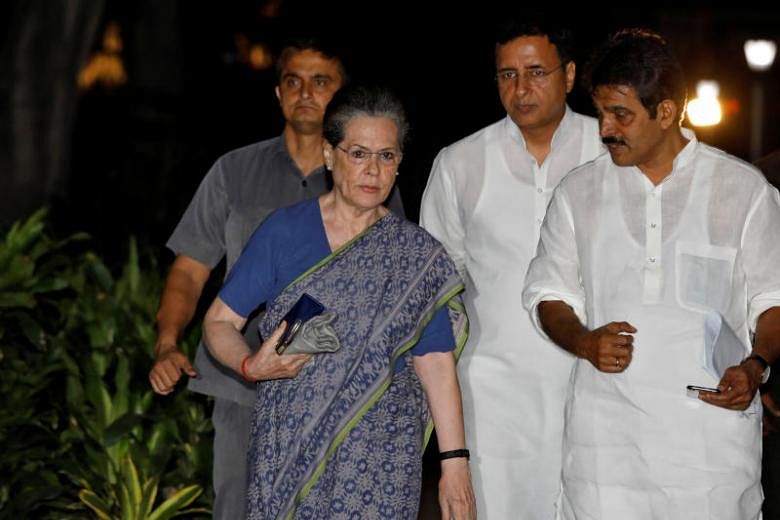NEW DELHI - Domestic political wrangling over the Regional Comprehensive Economic Partnership (RCEP) agreement has intensified in India with negotiations between the 16 member countries currently in their final phase in Bangkok.
Addressing a meeting at the Congress headquarters on Saturday (Nov 2), party president Sonia Gandhi said that any decision by the Indian government to sign the RCEP agreement will bring "untold hardship" for farmers, shopkeepers, small and medium enterprises.
"As if the government's economic decisions have not damaged the economy enough, it is now ready to deal a body blow to it by signing the RCEP... We can ill afford to become a dumping ground for products, including agricultural products from foreign countries," she added in her trenchant criticism of the current state of the Indian economy on a day when Prime Minister Narendra Modi landed in Bangkok for Asean-related summits and other programmes.
The Congress party also announced it will organise protests in all districts of the country from November 5 to 15 along with a rally in Delhi in December to highlight concerns such as the ongoing economic slowdown, unemployment, agrarian crisis as well as the RCEP.
Her comments drew a sharp retort from Minister for Commerce and Industry Piyush Goyal who tweeted on Saturday night that Ms Gandhi "has suddenly woken up to RCEP and FTAs".
"So where was she when trade deficit with RCEP nations increased from US$7 billion in 2004 to US$78 billion in 2014? When her Govt forced India to join RCEP negotiations with China in 2011-12," Mr Goyal added on Twitter. It was the Manmohan Singh government which had decided to join the negotiations for RCEP way back in 2012.
RCEP is a proposed free trade agreement between the 10 members states of Asean and its six other partner countries. India has been identified as the last holdout in the proposed trading bloc before Asean and regional leaders are handed over a report on the agreement on Monday.
Domestic factions in India, especially agriculture and industry lobby groups, have been opposing the RCEP deal, fearful of an influx of Chinese imports and a surge in import of primary produce, including dairy, from New Zealand and Australia.
This opposition to RCEP has gained greater strength given the current economic slowdown that has adversely affected rural as well as urban India. India's GDP in the April-June quarter of this financial year grew at just 5 per cent - the lowest in six years and a significant fall from around a growth of 8.2 per cent in the same period last year.
The Communist Party of India (Marxist) also said on Saturday that joining the RCEP will harm India's manufacturing and agriculture sectors and widen the country's current account deficit. "This will in turn have serious adverse consequences on employment and people's wellbeing," it added. Mr Thomas Issac, a CPI(M) leader and the finance minister for the state of Kerala, said a decision to join RCEP "can be compared only with Himalayan blunder of demonetisation".
"India's trade deficit with Asean has increased from US$5 billion in 2011 to US$22 billion in 2019, prompting India to review Asean agreement (the India-Asean FTA). Then what is the logic of making it more comprehensive and expanding it to Pacific countries and China with whom we already have huge deficit?" he added on Twitter on October 28.
The All India Kisan Sabha, a confederation of several farmer organisations from across the country, has also announced a nationwide protest on November 4.
"The writing is clearly on the wall," said Dr Ashwani Mahajan, the national co-convener of Swadeshi Jagran Manch, referring to the widespread public opposition to RCEP. The SJM is often described as the economic wing of socio-political organisation Rashtriya Swayamsevak Sangh (RSS), which close umbilical links with the ruling Bharatiya Janata Party (BJP) and wields significant influence over the government.
"Because of the India-Asean FTA, the domestic manufacturing sector has been a big loser, as well as the agricultural sector to a certain extent," he told The Straits Times. "Economics drives politics. So, I don't think the government would take the risk of joining the RCEP when the awareness in the manufacturing, dairy and agricultural sector is clear that this is not going to be beneficial for their sectors specifically. Moreover, there is a general perception in the country that this deal is not beneficial for the economy. No serious economist has favoured RCEP," Dr Mahajan added.
Prime Minister Narendra Modi, who is currently in Bangkok, told the Bangkok Post newspaper in an interview that India remains committed to a comprehensive and balanced outcome from the RCEP negotiations. "We recognise the high ambitions of our partners on goods. We too would like a win-win outcome. We believe that for this, addressing our concerns over unsustainable trade deficits is important," he added.


